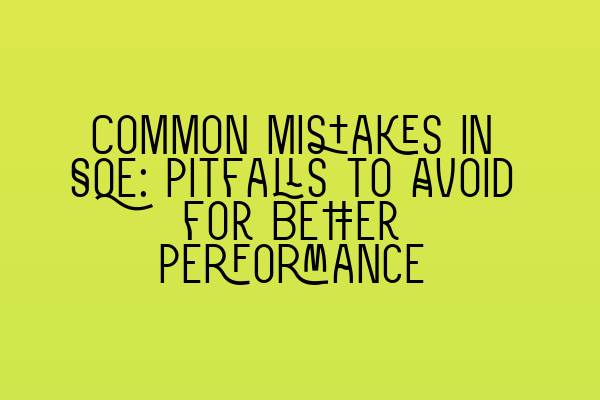When it comes to the Solicitors Qualifying Examination (SQE), avoiding common mistakes can greatly enhance your performance and increase your chances of success. The SQE is a rigorous exam that requires thorough preparation and strategic thinking. In this blog post, we will explore some of the most common pitfalls to avoid in order to improve your overall performance.
1. Lack of Understanding of the SQE Format
One of the most common mistakes made by SQE candidates is a lack of understanding of the exam format. It is crucial to familiarize yourself with the structure of the exam and the types of questions you will be asked. The SQE consists of two stages: SQE1 and SQE2. SQE1 assesses your functioning legal knowledge, while SQE2 tests your practical legal skills. By understanding the format, you can tailor your study plan accordingly.
2. Insufficient Exam Preparation
Insufficient exam preparation is another common pitfall for SQE candidates. It is vital to allocate enough time for studying and revision. Prioritize your study materials, create a study schedule, and ensure you cover all the relevant topics. Additionally, make use of practice exams and mock tests to familiarize yourself with the exam environment and improve your time management skills.
For comprehensive information on tenant rights in the UK and to understand your legal protections, check out our related article: Tenant Rights in the UK: Understanding Your Legal Protections.
3. Poor Time Management
Effective time management is crucial in the SQE. Many candidates struggle with completing the exam within the allotted time frame. To avoid this pitfall, practice answering questions under timed conditions. This will help you develop strategies for tackling questions efficiently and managing your time effectively. Additionally, make use of exam techniques such as skimming through questions before answering, prioritizing easier questions, and creating a rough outline for longer written responses.
4. Neglecting Legal Research
The ability to conduct effective legal research is vital for success in the SQE. Many candidates make the mistake of neglecting this aspect of their preparation. Familiarize yourself with commonly-used legal research databases and resources, and practice conducting research on various legal topics. This will not only enhance your understanding of the law but also improve your ability to analyze and apply legal principles.
For essential insights into legal considerations in residential leases, check out our related article: Legal Considerations in Residential Leases: Essential Insights for Solicitors.
5. Lack of Exam Technique Skills
Having good exam technique skills is crucial for performing well in the SQE. Many candidates overlook the importance of this aspect and focus solely on legal knowledge. However, knowing how to approach different question types, structure your answers, and showcase your understanding and analysis is equally important. Practice writing concise and well-structured responses, pay attention to grammar and clarity, and ensure you provide relevant legal references to support your arguments.
6. Failure to Review and Reflect
Another common mistake made by SQE candidates is the failure to review and reflect on their performance. After completing practice exams or mock tests, take the time to review your answers and identify areas for improvement. Assess your strengths and weaknesses, and adjust your study plan accordingly. Reflecting on your performance can help you refine your exam techniques, identify gaps in your knowledge, and make necessary adjustments to enhance your overall performance.
For aspiring property law professionals, workshops on land law can provide interactive learning opportunities. Find out more in our related article: Workshops on Land Law: Interactive Learning for Aspiring Property Law Professionals.
7. Neglecting Professional Ethics
Professional ethics are a crucial component of the SQE. Many candidates overlook the significance of this aspect and focus solely on legal knowledge and skills. However, demonstrating a strong understanding of professional ethics and applying ethical principles to real-life scenarios is essential. Familiarize yourself with the Solicitors Regulation Authority (SRA) Code of Conduct and Ethics, and practice applying these principles in your answers.
8. Lack of Real-World Application
The SQE goes beyond theoretical knowledge; it assesses your ability to apply legal principles to real-world scenarios. Many candidates make the mistake of providing generic answers without applying them to specific facts or situations. Practice analyzing case studies and applying legal principles to practical scenarios. This will demonstrate your ability to think critically and apply legal knowledge in a practical context.
For a comprehensive understanding of lease laws in the UK, unraveling the legal framework for tenants, check out our related article: Lease Laws in the UK: Unraveling the Legal Framework for Tenants.
9. Inadequate Exam Stress Management
The SQE can be a stressful experience, and many candidates struggle with managing exam stress. Inadequate stress management can significantly impact your performance. Prioritize self-care, maintain a healthy lifestyle, and practice relaxation techniques such as deep breathing and mindfulness. Additionally, develop a positive mindset and maintain a balanced perspective on the exam.
10. Failure to Seek Expert Advice
Lastly, failing to seek expert advice can be a detrimental mistake. Reach out to experienced solicitors or SQE tutors for guidance and support. They can provide insight into exam techniques, offer feedback on your practice answers, and provide valuable tips for success. Don’t hesitate to seek help when needed.
To navigate legal challenges in property transactions and gain expert tips for success, check out our related article: Navigating Legal Challenges in Property Transactions: Expert Tips for Success.
Conclusion
Avoiding common mistakes in the SQE can significantly improve your performance. By understanding the exam format, thoroughly preparing, managing your time effectively, conducting legal research, honing your exam techniques, reflecting on your performance, prioritizing professional ethics, applying legal principles to real-world scenarios, managing exam stress, and seeking expert advice, you can enhance your chances of success. Remember, the SQE is a demanding exam, but with proper preparation and strategic thinking, you can achieve your goals and excel in your legal career.

Leave a Reply